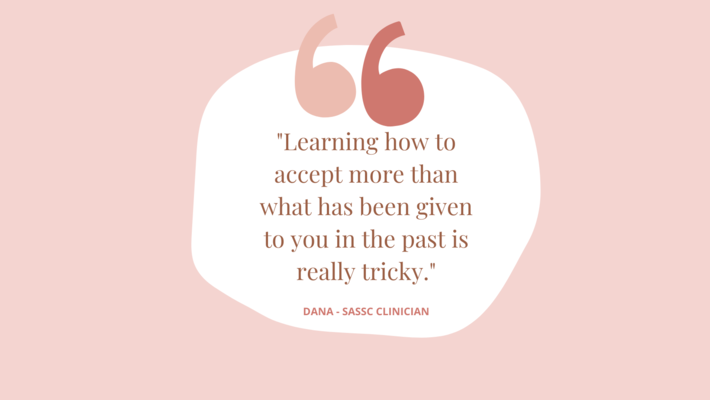

4th of March, 2021

“Learning how to accept more than what has been given to you in the past is really tricky and the fact that Aviva is able to give that back is invaluable.”
Dana* initially joined Aviva as a volunteer before eventually joining the Sexual Assault Support Service Canterbury (SASSC).
As a volunteer, she would occasionally hear stories that felt familiar and reminded her of her own experience being sexually assaulted as a teenager. “It was a really hard time for me. And I really wish I’d had a service like SASSC to help me when I was younger,” she explains. “I had problems with empowerment and showing people I was worth more than my circumstances. If I didn’t have people to say that I was needed, I don’t think I would have coped.”
However, that volunteer work proved to be the catalyst for Dana joining SASSC and incidentally helped her take the next step in overcoming her experience. “I feel like I know how people feel in that moment. I know how hard it is when something as intimate as sexual violence happens. It’s about power and control. This work gives me back some of the power and control. It means I have a foot in the door for how we give support.” She made the decision to join SASSC, thinking, “I’m going to help these people, because it wasn’t something I had.”
Dana works with people in crisis immediately following a sexual harm incident or report. “The counsellors are the ones that take you apart and glue you back together. But we’re industrial strength duct tape,” she explains.
“My work is really about giving people control back. People can decide what help they need and I’m here to help them with it. Giving people their autonomy back is part of the healing process.” The support she gives can extend to preparing people for police processes, offering healthy relationship and consent education, or in the worst cases responding to suicide attempts and linking people with the proper mental health teams. It also means working with those supporting others who have experienced sexual assault, such as engaging Human Resources departments on how to respond to a workplace incident or offering advice to parents on how to support their children.
One of the most important parts of Dana’s job is just to be by a client’s side without judgement. “We’re warm rocks. We aren’t always able to say anything. They just need us to be there,” she explains. And Dana is always willing to be there, whether it be sitting outside a police interview for hours or just being on the other end of a phone line to tell someone they are worthwhile. “I’ve had clients just call me during the day because they woke up feeling really sad, or they needed that encouragement to just go out and get their groceries. Sometimes it’s just a five-minute conversation of encouragement.”
Through her support work, Dana’s warm and comforting presence has helped people regain their confidence and recognise their worth. Dana shows people, “that the way they’ve been treated is not the way they’ve deserved to be treated.”
*Not her real name.